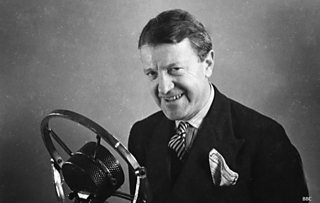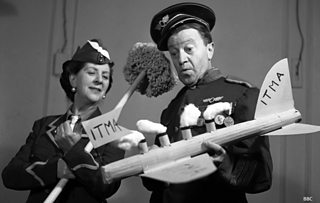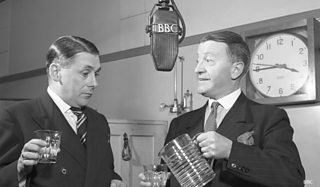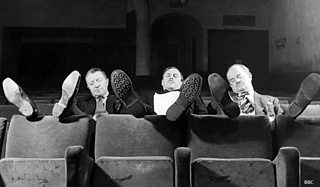
Tommy Handley, born 17 January 1894 (or 1892, or 12 January 1896, depending who you believe) was Britain's most popular comedian of the Second World War
On Sunday 9 January 1949, just after the 5pm repeat broadcast of the latest episode of , the nation’s favourite comedy show, there was a shock newsflash: Tommy Handley, the star of the programme, had died from a cerebral haemorrhage.
It’s That Man Again (ITMA) began 10 years earlier. It was an attempt to follow the success of , the ��������’s first regular weekly comedy and variety show. Handley, a well-known comedian who had first broadcast in , was chosen to star in the programme.
The first idea was a take on US comedy series, but this did not fit Handley’s style. Ted Kavanagh, Handley's regular writer, was brought in to help. The producer was Francis Worsley, who had worked with Handley on an outside broadcast about two years before. Handley, Kavanagh and Worsley would form a solid partnership through more than 300 programmes over the next decade.
Kavanagh's format saw Handley as the entertainment director of a cruise ship, with Cecilia Eddy as his secretary, Cilly, and Eric Egan as Vladivostooge, a Russian inventor. Comic patter was interspersed with items including songs, music from a resident orchestra, and a quiz. was chosen as the programme's title, from a popular newspaper headline of the time – but when the papers said it, they were talking about Adolf Hitler.
Six programmes were scheduled to go out fortnightly, starting in summer 1939, but only four had been broadcast when war broke out. The planned schedules were dropped in favour of music and talks, while various �������� production departments were evacuated to different parts of the country.

Mrs Mopp (Dorothy Summers) and Tommy Handley admire a model of a weapon to win the war in ITMA's middle years. Summers got her own show, The Private Life of Mrs Mopp, in 1946
The Variety Department was sent to Bristol, and it was from there that It's That Man Again was relaunched in . The cruise ship theme was ditched, and the quiz element of the show was quickly replaced by Radio Fakenburg, a spoof of Radio Luxembourg. It was also necessary to change the cast, as only actors who had been vetted by the Ministry of Information were allowed to broadcast. The new faces were and Jack Train.
Handley now became the Minister of Aggravation and Mysteries, in the Office of Twerps. Fun was made of the numerous departments and regulations which came into force with the start of the war, and the prevalence of acronyms inspired the renaming of the programme as ITMA, devised by Handley while doodling the show's title.
In early 1940 ITMA came off air while the cast embarked on a stage tour. Returning in summer 1941, ITMA was now set in Foaming-at-the-Mouth, a seaside town of which Handley became mayor, and it was temporarily renamed . Later in the war, Handley managed a munitions factory, became the Squire of Much-Fiddling, and then he was “a Man with a Plan”. The “plan” was lost, stolen, changed, etc, though it was never revealed what it actually was.
ITMA had a hectic pace, with Handley a master of quickfire delivery with a natural instinct for delivering a line perfectly. He was "on stage" almost constantly, interacting with other characters as they came and went, often via the famous "ITMA door". This was a small sound effects box that mimicked doors opening and closing. Other characters would pester Handley by phone, such as the , whose distinctive voice was achieved by speaking sideways into a glass tumbler.
The various broad-brush caricatures that populated ITMA all had their own catchphrases, which often passed into common parlance. When Maurice Denham was called up, Lola Tickle was replaced by Mrs Mopp (Dorothy Summers), whose entrance was accompanied by "Can I do you now sir?"; she departed to "TTFN" ("Ta Ta For Now"). Others regulars included Colonel Chinstrap, also played by Jack Train, who misinterpreted almost any remark as an offer of a drink ("I Don’t Mind if I Do"); the Diver ("I’m going down now sir") and Claude and Cecil ("After you Claude" - "No, after you Cecil").

Colonel Chinstrap (Jack Train) contemplates going on the waggon. The character also lived on beyond ITMA, including appearances on The Goon Show
In early 1941, due to the bombing raids on Bristol, the Variety Department had decamped to Bangor in North Wales. After a couple of years attacks on London seemed largely over, so the department returned to the capital, and ITMA was broadcast from the Criterion Theatre on Piccadilly Circus. In its last years, it came from the nearby Paris Studio.
There were experiments with broadcasting from the naval base at and Woolwich barracks, among other places, which helped determine the ideal audience size – too small and people became self-conscious; too large and it slowed the pace down. ITMA also pioneered warming up the audience, rather than plunging straight into the programme.
There was such demand for Handley that he also appeared in Tommy Handley’s Half-Hour, designed for overseas reception, and other programmes. ITMA is reckoned to have had the largest audience of any radio show in history – tens of millions, at home and worldwide. In 1942 the cast were even asked to perform a special show for the Royal Family and household at Windsor Castle.
As the war drew to an end ITMA celebrated Victory in Europe day with a . While the country struggled with austerity, ITMA got away from it all, and Handley became the governor of . There was a shake-up of the cast, with some familiar figures written out.

Tommy Handley, producer Francis Worsley and writer Ted Kavanagh hard at work on another edition of ITMA
For its last two series ITMA returned to Britain, where Handley was first a government adviser, then looking for work and living in a hostel called Henry Hall (after the bandleader). In the Handley was employed to look after a waxworks, which contained “The Hall of ITMA’s Past”, allowing cameos by some of the earlier characters.
The later cast included Molly Weir, (whose characters including Liverpool-accented Frisby Dyke, named after a Merseyside department store) and his future Sykes co-star, Hattie Jacques. Jacques played Sophie Tuckshop, a schoolgirl glutton who would describe her eye-watering – if not mouth-watering – feasts (“But I’m all right now”).
When Handley died in 1949, the nation was stunned. There were outpourings of grief at his passing, with memorial services in both London and Liverpool.
It’s hard to judge the humour of the past objectively. The modern ear may struggle to find anything funny in ITMA, with its catchphrases and tortuous puns – but it was of its times. Many references were highly topical, quickly becoming so obscure that even the production team couldn’t remember what they meant. But this feeling of a finger on the pulse was part of its appeal. Among the danger of wartime, and in the difficult peace that followed, it was part of the fabric of shared experience, keeping people calm and carrying on.
